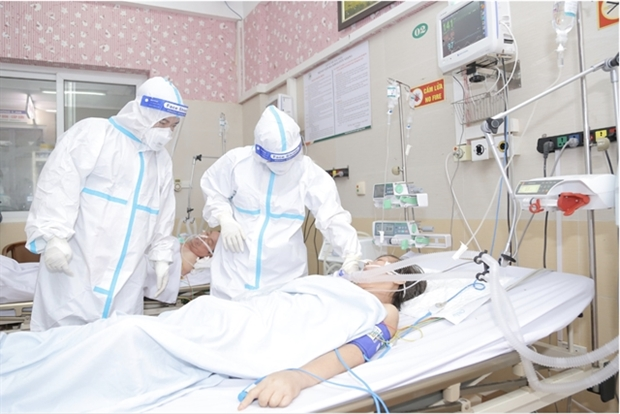The Ministry of Health has issued guidelines on the diagnosis, treatment and infection prevention of COVID-19, ready to be implemented immediately when the disease is downgraded.

A COVID-19 patient treated in hospital (Photo: Suckhoedoisong.vn)
COVID-19 patients will not be given free treatment when the disease is downgraded from its current placement in Class A infectious diseases to Class B, said Deputy Minister of Health Nguyen Thi Lien Huong.
Patients who have health insurance will be covered as per regulations, Huong said at a recent talk.
According to the deputy minister, the Ministry of Health (MoH) and the Ministry of Justice (MoJ) have advised the Prime Minister to sign a decision invalidating Decision 447 to switch COVID-19 from group A to group B.
The MoH has issued professional guidelines on the diagnosis, treatment and infection prevention of COVID-19, ready to be implemented immediately when the disease is downgraded to the flu-like status this month.
Regarding the issue, Phan Trong Lan, Director of the MoH’s Health Preventive Department, said that the infectious disease surveillance system always monitors the situation in a comprehensive manner.
Lan said: “When switching COVID-19 disease from group A to group B, disease classification is mainly based on pathology according to the Law on Prevention and Control of Infectious Diseases.”
In Vietnam, group A mainly focuses on administrative measures. When switching to group B, the control activities on social administration will be removed, said Lan.
In other words, if the disease is in group A, the fight against the epidemic is participated in by relevant ministries and branches along with the healthcare sector. However, if a disease is categorised as group B, it is dealt with by the health sector, he said.
At present, the number of hospitalised COVID-19-infected persons is lower than before, and the severity rate has also decreased to equal or lower than that of some infectious diseases in group B, the director said.
According to the MoH, since earlier this year, the whole country has recorded 85,493 cases of COVID-19, with an average monthly record of 17,000 cases, a decrease of 8.5 times compared to 2021 and 48 times less than 2022. There have been 20 deaths, a sharp decrease to 0.02% compared to 1.86% and 0.1% in 2021 and 2022, respectively.
The deaths recorded during this time are all cases who had been treated for serious underlying diseases, most of whom had not received sufficient vaccinations against COVID-19.
The number of doses of the COVID-19 vaccine administered per 100 people in Vietnam is 1.6 times and the primary dose rate is 1.4 times higher than the world average.
Based on the situation of the COVID-19 pandemic in Vietnam, in comparison to the provisions of the Law on Prevention and Control of Infectious Diseases, and following the updated recommendations of the World Health Organisation, the MoH has proposed to downgrade COVID-19 from group A to group B.
The MoH has implemented disease prevention measures suitable for the new situation for the period of 2023-2025.
Along with that, the ministry has also reviewed and continuously updated guidelines for COVID-19 prevention and control. They are also monitoring severe cases of pneumonia and COVID-19 in the community and enhancing COVID-19 vaccination.
Vietnam classifies infections into three classes A, B, and C, mostly according to the degree of severity.
Group A includes highly dangerous infectious diseases that can spread rapidly, widely, and have a high death rate or the cause of the disease is not yet known.
Class B includes dangerous infectious diseases that can be rapidly transmittable and fatal.
And Class C embraces less dangerous and not rapidly transmittable infectious diseases.
VNA